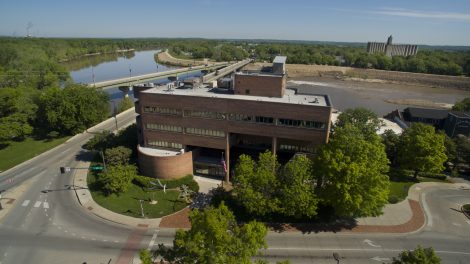Committee to study possibility of directly electing Lawrence mayor, plus other potential changes to city governance

photo by: Nick Krug
Lawrence City Hall, 6 E. Sixth St., is pictured on May 3, 2016.
Lawrence city leaders are moving forward with creating a committee to study potential changes to the city’s form of government, potentially paving the way for a citywide election to decide on any changes.
As part of its study session Tuesday, the Lawrence City Commission discussed alternative structures to the city’s current commission-manager form of government, including having a directly elected mayor, election by districts, or changes to the number of commissioners, among other possibilities. Commissioners agreed that they would each suggest two community members to take part in the committee, and the commission would set some parameters for the discussion.
Commissioner Jennifer Ananda said that creating a committee would help the commission get feedback from the people in the community with experience or expertise on the topic. Ananda, who initiated the larger discussion by proposing that the commission consider having a full-time directly elected mayor, said that she obviously had an idea of what she thought would be best based on her own experience but that others in the community had more experience with the subject.
“I think that there are people who would have incredible contributions to this dialogue, and I do think it’s an opportunity to engage our whole community in this dialogue prior to even just throwing it into a vote,” Ananda said.
The commission-manager form of government employs an elected commission, appointed professional city manager and what is known as a rotating mayor. Commissioners elect the mayor to a one-year term, and by tradition they choose based on whoever received the most votes in the most recent election, though there have been exceptions. The mayor presides over commission meetings and has ceremonial duties, but has no additional powers and, like other commissioners, works part time.
Regarding limiting parameters, commissioners agreed that they did not want to consider abolishing the practice of having a professional city manager to run the day-to-day operations of the city. No clear preferences were expressed at this point as to whether a directly elected mayor would have any additional powers, which could include tie-breaking or veto powers, though Commissioner Stuart Boley said he would want to ensure there was a clear system of practical checks and balances.
The idea of electing commissioners by geographic areas known as districts or wards also had some interest among commissioners. Currently all five commissioners are elected at large, meaning that they all represent the city as a whole. A system of districts would require the commissioner for each seat to live in a certain geographic area. Deputy City Attorney Randy Larkin said if the city were to move to a district system, certain requirements would apply under state law. Those include that there must be at least four geographically compact and contiguous districts; that district dividing lines should follow voting precinct boundaries; each district must have approximately the same population; and the city would be required to revisit and readjust the guiding lines to ensure populations remained approximately the same.
Mayor Brad Finkeldei and other commissioners agreed with Ananda that community members would have valuable contributions to the discussion as part of a committee, including former mayors and people involved with the University of Kansas School of Public Affairs and Administration. Finkeldei said in the conversations he has had so far some residents have very strong feelings about creating districts, which he said was evident in the debate about creating a second high school years ago.
“I think the community of Lawrence, going all the way back to the Free State-Lawrence High division, is a little hesitant to divide the community up,” Finkeldei said. “So it will be interesting to see what the community feels about that but I certainly thinks it’s worth considering.”
City Manager Craig Owens said that as commissioners further develop the parameters of the committee’s work, it would be important for them to identify which aspects of governance they hope to improve or what issues they hope to resolve by making changes to the city’s form of government. He said such directional conversations could help provide guidance for the committee and were a key consideration.
“There are wide varieties of forms (of government) that work very effectively, so I think it’s just really about having a conversation about if this is the answer, what’s the problem, and understanding what it is you’d like to have achieved,” Owens said. “Because any path will get you there if you don’t know where you’re going.”
Larkin told the commission two methods existed under Kansas law for a city to modify its form of government: a citywide election or a charter ordinance, which would have to be passed by four of the five commissioners and could still be put to a citywide vote if a valid protest petition were filed. Commissioners said they agreed with the city staff recommendation that any changes should go to a public vote.
After each commission suggests two community members for the committee, the commission as a whole will come to an agreement on the committee’s members and a committee chair. Owens said someone from the city attorneys office would also participate because of the legal aspects involved. Once the committee makes a recommendation regarding any changes to the city’s form of government, the commission would consider that recommendation and decide whether to go forward with a citywide election.






